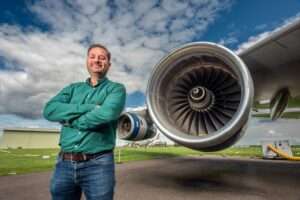Take-off with Firefly at our SAF Summit

Over the past year, Firefly has been progressing its FOAK project in Harwich, Essex, UK. We have moved on to the next stage of scale-up, testing some of the commercial-scale equipment that will eventually be used at our Harwich facility. The fuel produced is also progressing through ASTM approval as a new pathway, sewage biosolids to jet (SBTJ).
We have also been expanding, with a new office and a growing team, and continue to develop international partnerships — most notably with Synagro in the US, with whom we are planning to develop a second facility in the coming years.
Boeing announced their investment and technical support for Firefly, with SBTJ being seen as a fuel that can be produced wherever there is sewage. Further investments will shortly be announced.
Can you reveal what you intend to focus your presentation on?
Our presentation will focus on our innovative technology and the brand-new SBTJ pathway, which I mentioned earlier, that we are bringing online to convert sewage biosolids into fuels.
I will reveal more details about the FOAK facility being constructed in Harwich, Essex, along with the global potential of this new route to SAF.
How important are events like ours and what do you hope to get out of them?
Events like these are always fantastic opportunities to network and to build excitement and interest in the work that we are doing.
With a focused group of key stakeholders — such as biofuels producers, airlines, and investors — it is a fast-track way to have the conversations needed to progress the SAF industry.
For Firefly, what are some of the challenges facing the SAF production industry at the moment?
A major challenge that most SAF producers face is feedstock availability — a problem that Firefly has found a solution to.
Our SAF is made from sewage biosolids, a low-value waste with very few applications that we produce in vast quantities all over the world every day.
There is also the challenge of commercial operators reaching FID, something we are addressing through commercial partnerships, such as with Chevron Lummus Global, and long-term, bankable offtakes, such as our 15-year offtake agreement with Wizz Air.












